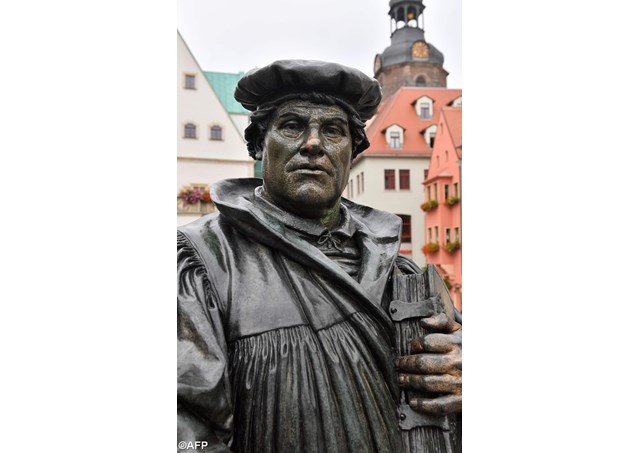
Rome conference sheds new light on Luther and the sacraments

(Vatican Radio) Luther and the sacraments: A Catholic re-reading in an ecumenical perspective. That was the title of a conference which took place at Rome’s Gregorian university this week, exploring the profound changes in understanding that have evolved over the past decades of theological dialogue.
These changes, according to the organisers, can help Catholics and Lutherans “understand anew the concerns of Martin Luther’s theology”.
Among those taking part in the conference was theology professor and ecumenical expert Annemarie Mayer from the Catholic University of Leuven in Belgium.
She talked to Philippa Hitchen about the focus of this encounter, which was held to mark the 500th anniversary of the beginnings of the Protestant Reformation….
Annemarie notes that according to legend, the Reformation began when Martin Luther nailed his 95 theses to the door of a church in Wittenburg, though she adds that “probably this never happened.” But those theses, she says, were mainly concerned with indulgences, penitence, confession and the question: ‘Can you buy God’s grace or not?’
The main focus of the Rome conference, she says, is on the seven sacraments of the Catholic Church, while recognizing that Lutherans largely regard only “the so called major sacraments of Baptism and Eucharist as real sacraments”.
Professor Mayer says the discussions explored the question of personal confession, asking “is this still a sacrament for Lutherans or not?” Today, she says “the worldwide Lutheran tradition has developed in different lines” with some still practicing confession with an ordained minister, others saying it can be done by lay people, and others who don’t have individual confessions any more.
On the Catholic side, she continues, after half a century of ecumenical dialogue, it’s important to realise that “the Roman Catholic Church is, these days, in very many aspects what Luther had worked for and argued for, so there we see there are a lot of convergences”.
The conference also heard presentations on the sacraments of ordination and Eucharist, linked to the key questions of who can be ordained to the priesthood. Annemarie notes that in his opening address, Cardinal Kurt Koch presented a “future vision” of dialogue over the coming decades, saying that after the Joint Declaration on the Doctrine of Justification – which the World Communion of Reformed Churches is expected to sign up to shortly – the next step “might be to try to reach a joint declaration on the sacraments, on ministry and on the understanding of the Church. Is the Church necessary to mediate between God and human beings?”
This year’s 500th anniversary, Annemarie says, marks an event which brought about the split of the Church in the West and “started off a whole stream of blood in the religious wars, hence the way Catholics prefer to “commemorate” rather than to “celebrate” this event.
But in Luther’s day there were also important attempts to avoid the divisions and to “reach common ground,” Annemarie says, including the 1530 Augsburg confession upon which “every Lutheran pastor worldwide is still ordained” today. Perhaps it might be appropriate, she concludes, to commemorate this in 2030, rather than just forgetting about our Catholic-Lutheran struggles in ecumenism once 2017 is over.” So, in this sense, she says, there are more and very interesting things to come!”
| All the contents on this site are copyrighted ©. |


